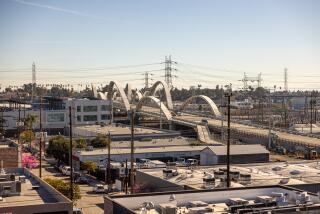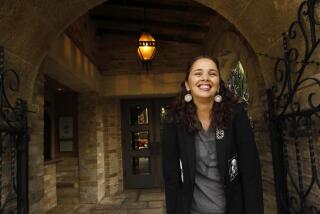$450,000 Approved to Fund Limited Use of Theatre Center : Arts: Plans call for continued ethnic workshops at defunct city-owned playhouse, plus shows produced by independent companies.
The Spring Street complex that formerly housed the Los Angeles Theatre Center will remain in limited use at least through June 30, according to a “caretaker” plan approved by the City Council Wednesday.
The plan frees $450,000 in capital improvement funds to be used for operational expenses at the downtown municipal theater. City officials say they expect the complex to be used for workshops by the LATC’s ethnic labs and for “self-produced shows” by independent companies.
“It’s an attempt, on a short-term basis, to keep the theater alive,” said Councilman Richard Alatorre, who co-sponsored the measure with Councilman Mike Hernandez.
The Latino Theatre Lab, which has been conducting a sleep-in at the building, has scheduled a fund-raiser for Monday--the first event since the LATC building closed Oct. 13.
The council action gives the city Cultural Affairs Department authority to begin negotiations with anyone interested in operating the building on a permanent basis after July 1.
At the insistence of Councilman Zev Yaroslavsky, the motion was amended to ensure that any long-term agreement has council approval. The proposal passed 11 to 1, with Councilwoman Joy Picus dissenting.
Meanwhile, a new player entered the debate over the future of the facility, in which the city and Community Redevelopment Agency have invested more than $27 million.
The Nederlander Organization probably will make a bid to operate the building, said Stan Seiden, president of James M. Nederlander Companies (West).
The Nederlander firm already leases the Greek Theatre from the city. It also operates the Pantages and Henry Fonda theaters in Hollywood, the Wilshire Theatre in Beverly Hills and the Pacific Amphitheatre in Costa Mesa.
Although most of its operations are commercial productions of plays or pop music acts, it runs the Los Angeles Civic Light Opera on a nonprofit basis.
Seiden said his company wouldn’t expect to make any money at the LATC facility. But he said it would be used for “workshops and tryouts” like “The Lay of the Land,” starring Dudley Moore. That LATC production, still in previews, was suspended when LATC closed its doors.
Terms of any agreement between the Nederlander company and the city would have to be worked out, said Seiden, but he noted that the firm’s stewardship of the Greek had never required city subsidy.
The seedy Spring Street neighborhood is often cited as one cause of the LATC’s collapse, but Seiden sounded unfazed: “It’s not the best neighborhood in the world. But people go to shows, not to theaters.”
Until now, most talk about the long-term future of the facility has centered on a consortium that might include the Center Theatre Group, CalArts, Cal State Los Angeles and one or more of the ethnic labs under LATC’s wing.
Members of the most prominent LATC lab, the Latino Theatre Lab, have slept on the LATC premises since the closing of the company, vowing to remain until the city agreed to let them stay.
Although the council motion did not make a specific commitment to the Latino Lab, the group’s director, Jose Luis Valenzuela, said that his sleep-in will now end because of verbal assurances he has received from Al Nodal, general manager of the Cultural Affairs Department. Nodal could not be reached for comment.
In a separate motion, the council authorized spending $7,000 to send hundreds of high school students to a production at the Mark Taper Forum. The students had been set to attend “The Night of the Iguana” this month as part of LATC’s Theatre as a Learning Tool program.
More to Read
The biggest entertainment stories
Get our big stories about Hollywood, film, television, music, arts, culture and more right in your inbox as soon as they publish.
You may occasionally receive promotional content from the Los Angeles Times.










